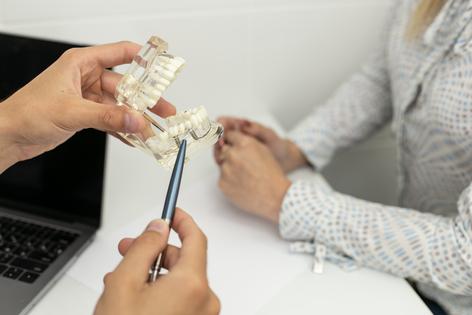Tooth loss truth: It’s no longer about the tooth fairy
Published in Health & Fitness
When you hear the phrase tooth loss, what comes to mind first? Trauma? Tooth decay? The tooth fairy? While all of these are acceptable associations, there are many more factors involved in tooth loss. From a population perspective, older Americans are keeping their teeth longer, according to a 2016 study. In fact, complete tooth loss has decreased by more than 75% in adults 65 to 75 years old over the past five decades.
However, keeping your teeth longer also means caring for them longer. This study also showed that the prevalence of complete or severe tooth loss is higher among individuals with chronic diseases or overall worse health, compared to those without these conditions. Given that six in 10 adults in the U.S. have a chronic disease, tooth loss is an important topic to discuss. Let’s break down an example of how chronic disease relates to tooth loss, what else influences tooth loss, and ways to prevent it.
Periodontitis
Periodontitis is one of the leading causes of tooth loss. Bacteria, plaque, and tartar buildup on teeth can cause inflammation and infection that can spread below the gum and lead to loss of bone and teeth, if severe. It is very common, as about 70% of adults 65 and older and 47% of adults 30 and older have some form of periodontal disease. Over the years, research has shown that certain factors, including chronic diseases, increase risk for periodontal disease. For example, diabetes, which impacts one in 10 Americans, has a bidirectional relationship with periodontal disease, where controlled periodontal disease can help control blood sugar levels and vice versa.
Tooth decay
Tooth decay, or caries (cavities), is another leading cause of tooth loss. Like periodontal disease, tooth decay is caused by bacteria in your mouth. These bacteria build up in sticky plaque on your teeth and feed on sugars in your diet. As a result, they release acids that break down your teeth. If left untreated, the decay can destroy large portions of your teeth, leading to pain, tooth fracture, and (if severe) tooth loss.
Trauma
While periodontitis and tooth decay are highly preventable, accidents happen. Whether it’s sports or chewing hard food, teeth can be knocked out or break. In either scenario, it is critical to know how to manage dental emergencies and see your dentist immediately. If a tooth is knocked out, remember these dos and don’ts from the American Association of Endodontics:
Do
Don’t
If your tooth breaks but isn’t knocked out, call to consult your dentist, and schedule an appointment immediately. Keep the area clean by rinsing with warm water, especially if your gums are sore. If there are any sharp edges of the tooth, dental wax is available at most drugstores.
Social determinants of health and tooth loss
A study led by investigators at the Harvard School of Dental Medicine suggested that "machine-learning algorithm models incorporating socioeconomic characteristics were better at predicting tooth loss than those relying on routine clinical dental indicators alone."
Furthermore, new research reported that
Therefore, it is important to consider how disparities in access to and use of dental care impact not only tooth loss but also oral and overall health.
Prevention and oral health in the age of the pandemic
Tooth loss is not just about losing a tooth. It can significantly impact your quality of life, from affecting speech and self-esteem to restricting your diet (which can lead to either weight loss or obesity). Furthermore, the COVID-19 pandemic led to an increase in stress-related oral health conditions like teeth grinding and cracked or chipped teeth.
While the cause of tooth loss can be related to many things, it is largely preventable. You can avoid pain and losing your teeth with a few simple steps at home focused on limiting the amount of bacteria in your mouth and seeing your dentist regularly.
Lastly, while there may be concerns about returning to normal life during the pandemic, Americans should feel comfort in knowing that dental offices have remained safe, likely due to the fact that dentistry has been a leader in infection control even before COVID-19.
(Tien Jiang, DMD, MEd, is a contributor to Harvard Health Publications.)
©2022 Harvard University. For terms of use, please see https://www.health.harvard.edu/terms-of-use. Distributed by Tribune Content Agency, LLC.










Comments